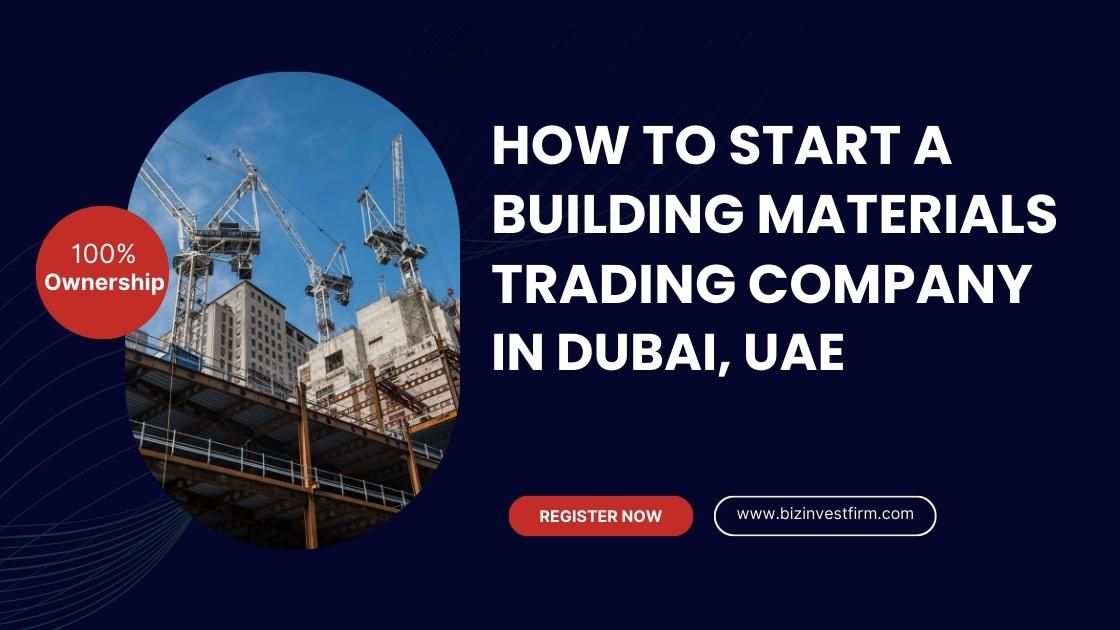Dubai’s construction industry is thriving, fueled by ambitious real estate projects, infrastructure developments, and the legacy of Expo 2020. The city’s skyline continues to evolve with iconic skyscrapers, residential communities, and mega-projects, creating a robust demand for building materials. Entrepreneurs eyeing opportunities in this sector find Dubai an ideal destination due to its strategic location, business-friendly policies, and access to global markets.
Starting a building materials trading company in Dubai offers immense potential for growth, whether supplying cement, steel, or sustainable materials. This guide outlines the process, costs, and strategies to establish a successful trading business in this dynamic market. From choosing the right jurisdiction to securing licenses and building networks, we’ll cover everything you need to launch your venture efficiently.
Why Dubai is the Best Place to Start a Building Materials Trading Business
Dubai’s unique advantages make it an ideal location for a trading business. Here’s why you should consider this venture:
Booming Construction Industry
Dubai’s construction sector is a powerhouse, driven by projects like Dubai Creek Tower, Emaar Beachfront, and ongoing infrastructure expansions. The city’s vision for sustainable urban development and smart cities keeps demand for construction materials high. This creates a fertile ground for businesses trading in building supplies.
Strategic Location & Logistics Hub
Located at the crossroads of Europe, Asia, and Africa, Dubai serves as a global trading hub. Its world-class ports, like Jebel Ali, and advanced logistics infrastructure ensure seamless import and export operations. Businesses can efficiently supply materials to the GCC, African, and Asian markets.
Business-Friendly Policies
Dubai allows 100% foreign ownership in most sectors, including trading, especially in free zones. The Department of Economic Development (DED) and free zone authorities streamline business setup processes. This flexibility attracts entrepreneurs worldwide to start a building materials trading company in Dubai.
Tax Benefits & Market Opportunities
Free zones offer zero import/export duties and no personal income tax. The UAE’s low corporate tax rate enhances profitability. A growing focus on green construction opens new market opportunities for innovative materials.
Building Materials in High Demand in Dubai
The construction boom fuels demand for various building materials. Key products include:
- Cement & Concrete Products: Essential for foundations, structures, and precast elements.
- Steel & Metal Products: Widely used in high-rise buildings and industrial projects.
- Timber & Wood: Popular for interior fit-outs and sustainable construction.
- Paints & Coatings: High demand for weather-resistant and aesthetic finishes.
- Electrical & Plumbing Supplies: Critical for residential and commercial developments.
- Glass, Tiles, Ceramics: Sought for modern architectural designs.
- Green & Sustainable Materials: Increasingly popular due to eco-friendly building trends.
Businesses can capitalize on these categories to meet market needs. Staying updated on trends, like sustainable materials, ensures a competitive edge.
Legal Structures & Jurisdictions for Trading Company Setup
Choosing the right legal structure impacts ownership, liability, and taxation. Dubai offers several options tailored to different business needs.
Mainland Company
A mainland company, licensed by the DED, allows trading across the UAE and internationally. It offers flexibility to work with local contractors and developers. A local sponsor may be required for certain activities, though 100% ownership is now possible in many cases.
Free Zone Company
Free zones like Jebel Ali Free Zone Authority (JAFZA), DMCC, RAKEZ, and Dubai South are ideal for trading businesses. They offer 100% ownership, no customs duties, and quick setup processes. Free zone companies focus on international trade but can serve the UAE market through distributors.
Offshore Company
An offshore company is suitable for international trade but cannot operate directly in the UAE market. It’s a cost-effective option for businesses focused on global exports. Setup is quick, but local trading requires additional licensing.
Documents Required for a Building Materials Trading License
To obtain a building materials trading license in Dubai, you’ll need to submit specific documents. Ensure all paperwork is complete to avoid delays. Here’s a checklist:
- Completed application form from the Department of Economy and Tourism (DET).
- Passport copies of shareholders and directors.
- UAE residence visa copies for all stakeholders.
- No-Objection Certificate (NOC) from sponsors or employers (if applicable).
- Memorandum of Association (MOA), notarized and signed by shareholders.
- Trade name reservation certificate.
- Lease agreement (Ejari) for a physical office or warehouse.
- Business plan outlining trading activities and objectives.
How to Start a Building Materials Trading Company in Dubai
Step-by-Step Process to Start a Building Materials Trading Company in Dubai.
Decide Business Activity & Structure
Choose “Building Materials Trading” as your business activity. Decide between a sole proprietorship, LLC, or free zone entity based on your goals. This defines your licensing and operational scope.
Choose Jurisdiction: Mainland vs Free Zone
Mainland allows direct UAE market access but may involve higher costs. Free zones offer tax benefits and simpler setups but restrict local trading without distributors. Evaluate your target market to decide.
Trade Name Registration
Select a unique trade name adhering to DED or free zone guidelines. Avoid religious or offensive terms. Check availability through the DED portal or free zone authority.
Apply for Initial Approval
Submit your business plan and passport copies to the DED or free zone for initial approval. This confirms your eligibility to proceed. It’s a mandatory step for all setups.
Draft & Sign Memorandum of Association
For mainland LLCs, draft an MOA outlining ownership and profit-sharing. Sign it with your local sponsor (if required) and notarize it. Free zone companies skip this step.
Secure Office/Warehouse Space
Mainland businesses need an Ejari-registered office or warehouse. Free zones offer flexi-desks or dedicated warehouses. Location and size impact costs significantly.
Apply for Trade License
Submit documents like initial approval, MOA, and lease agreements to obtain your building materials trading license Dubai. Free zone licenses are typically issued faster.
Import/Export & Customs Registration
Register with Dubai Customs to obtain a customs code. This is essential for importing and exporting materials. Ensure compliance with customs regulations.
Visa & Immigration Procedures
Apply for an investor visa (for owners) and employee visas. Free zones often include visa quotas in license packages. Mainland visas depend on office size.
Open a Corporate Bank Account
Choose a UAE bank like Emirates NBD or Mashreq. Submit your trade license, MOA, and KYC documents. This enables smooth financial transactions.
Cost of Starting a Building Materials Trading Company in Dubai
The building materials trading license cost in Dubai ranges from AED 15,000 to AED 50,000, depending on the setup. Mainland licenses, issued by the DED, typically cost AED 30,000 to 50,000, covering application fees and administrative expenses. Free zone licenses start at AED 15,000, excluding visa and consultancy fees.
- Mainland License: AED 20,000–40,000 (approx. £4,500–£8,500), including DED fees and sponsor costs (if applicable).
- Free Zone License: AED 12,000–25,000 (approx. £2,500–£5,500), depending on the free zone.
- Additional Costs:
- Warehouse Rental: AED 50,000–200,000 annually, based on size and location.
- Visa Processing: AED 3,000–5,000 per visa.
- Customs Registration: AED 500–1,000.
- Bank Account Opening: Minimal fees, but some banks require a minimum balance.
The Dubai mainland trading license cost varies based on office space and sponsor agreements. Free zones are generally more cost-effective for startups.
Timeframe for Setting Up the Business
- Mainland Setup: Takes 2–3 weeks, including approvals, MOA notarization, and Ejari registration.
- Free Zone Setup: Completed in 5–10 working days, thanks to streamlined processes.
- Offshore Setup: Fastest, requiring 3–7 working days for registration.
Delays may occur due to documentation errors or additional approvals. Working with consultants can expedite the process.
Compliance & Regulatory Requirements
Trading building materials requires adherence to strict regulations. Obtain approvals from Dubai Municipality for construction-related products. Ensure materials meet safety and quality standards, such as ISO, CE, or Emirates Conformity Mark. Environmental regulations are critical, especially for sustainable materials. Maintain accurate import/export documentation to avoid customs penalties. Regular audits ensure compliance and protect your business reputation.
Marketing & Growth Strategies
Marketing & Growth Strategies for Building Materials Trading in Dubai.
Building B2B Networks
Forge partnerships with construction firms, developers, and contractors. Attend industry events to connect with decision-makers. Strong B2B relationships drive consistent orders.
Digital Presence
Create an SEO-optimized website showcasing your product range. Use LinkedIn and B2B portals like Alibaba to reach global clients. Share case studies to build credibility.
Exhibitions & Trade Shows
Participate in events like Big 5 Dubai and Cityscape Global. These platforms showcase your products to a wide audience. Networking at trade shows boosts visibility.
Diversifying Product Range
Incorporate eco-friendly materials to tap into the growing demand for sustainable construction. Offer innovative products like energy-efficient glass or recycled concrete. Diversification attracts a broader client base.
Challenges & Risks to Consider
The building materials market in Dubai is competitive, with established players dominating. Obtaining regulatory approvals for specific materials, like chemicals, can be time-consuming. Import/export costs may fluctuate due to global supply chain issues. Maintaining a reliable supply chain is crucial to meet client deadlines. Proactively addressing these challenges ensures long-term success.
Role of Business Setup Consultants
Business setup consultants simplify the process of starting a building materials trading company in Dubai. They help choose the right jurisdiction, handle paperwork, and secure approvals. Consultants also assist with customs registration and bank account setup. Their expertise saves time and reduces errors, ensuring a smooth launch.
Conclusion
Dubai’s construction boom creates a thriving market for building materials, making it an ideal location to start a building materials trading company in Dubai. Whether choosing a mainland or free zone setup, entrepreneurs benefit from the city’s strategic location, tax advantages, and business-friendly environment. By navigating the building materials business setup UAE process carefully and ensuring compliance, your company can tap into lucrative opportunities.
Partner with construction firms, leverage digital marketing, and explore sustainable products to stay competitive. For a seamless launch, consult experts like BizInvestFirm to guide you through licensing, approvals, and growth strategies. Start your journey today and capitalize on Dubai’s dynamic construction sector.
FAQs
How much does it cost to start a building materials trading company in Dubai?
Costs range from AED 12,000–40,000 for licenses, plus warehouse and visa fees.
Do I need a warehouse for a building materials license?
Yes, for mainland businesses; free zones offer flexi-desks for smaller operations.
Can a foreigner own 100% of a trading company in Dubai?
Yes, in free zones and most mainland sectors since recent reforms.
Which free zone is best for building materials trading in Dubai?
JAFZA and Dubai South are ideal due to logistics and trading facilities.
What approvals are required for importing construction materials?
Dubai Municipality approvals and quality certifications like ISO or CE are needed.



